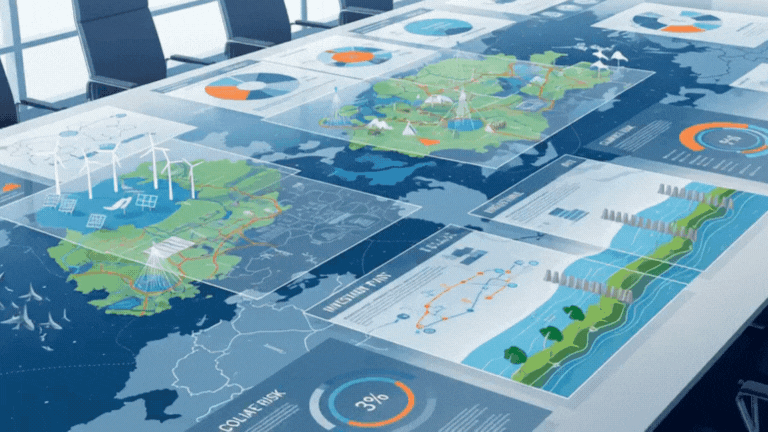Managing the Fatigue of Long-Term Decarbonization
In year two or three of decarbonisation, dashboards may improve but business as usual still dominates. Fatigue stems from fragmented data, unclear decision rights and procurement friction. Closing the implementation gap demands process redesign, embedded standards and disciplined operating metrics.
Beyond SaaS: Why 'Scientific Superintelligence' is the Next Billion-Dollar Thesis for Climate Tech Investors
Climate tech investment is shifting from incremental SaaS towards AI-driven scientific discovery. Scientific superintelligence is accelerating breakthroughs in decarbonisation, green hydrogen, and carbon capture, reshaping how investors drive scalable climate impact across global markets.
The Dubai Convergence: What Founders Need to Know About MENA's New Innovation Triangle
Scaling in MENA demands more than fundraising trips to Dubai. Founders must align with the region’s infrastructure boom, embedded climate regulation and fast-moving digital systems. Success comes from pilots tied to real assets, local partnerships, and capital strategies built for long-cycle projects, not quick wins.
A Pragmatic Guide to Achieving Europe's 2040 Climate Goals
A pragmatic analysis of Europe’s 2040 climate goal, examining policy realism, investment gaps, industrial trade-offs and political constraints. We argue credible delivery depends on technology diversity, capital mobilisation and honest timelines, rather than just target setting or over-reliance on electrification.
A Strong Narrative is Your Most Important Go-to-Market Asset
A strong narrative remains the most decisive go-to-market tool in climate tech. Investors and customers back teams whose stories make success feel inevitable, connect macro climate forces to credible solutions, and translate impact into measurable proof that can travel across decks, websites, and sales calls.
Why Integrating Climate and Development Finance is Key to Global Progress
Integrated climate and development finance is now essential for countries facing rising climate shocks and tight fiscal space. Governments need unified strategies that align climate risk, growth, debt, and investment so every public dollar strengthens resilience and supports long term development outcomes.
Pay-for-Performance Could Be A New Contracting Model for Corporate-Startup Climate Partnerships
As COP30 opens in Belém, one message is unmistakable: the era of pledges is over, and delivery defines leadership. Many corporates remain stuck in pilot mode, but results-based, pay-for-performance models could finally align innovation, finance, and measurable climate impact.
The Global Climate Talent Race: How MENA and Europe Can Win the Post-H-1B Era
The US’s $100,000 H-1B visa fee is reshaping global talent flows. As America closes its doors, MENA and Europe are seizing the moment with bold visa reforms and green investments to attract the world’s top climate innovators.
The 'AstraZeneca Model' for Heavy Industry: Why Acquiring Specialized AI is the Fastest Path to Decarbonization
Heavy industry can close the vast decarbonization gap faster by adopting an “AstraZeneca Model” — acquiring or partnering with proven AI specialists instead of building in-house. This approach accelerates emissions reduction, overcomes stalled pilots, and aligns incentives for measurable climate impact.
Could Material Regulations Drive Climate Breakthroughs?
New material regulations are reshaping industries, turning compliance into opportunity. From biodegradable packaging to circular manufacturing, policy-driven constraints are sparking breakthroughs in sustainable materials, accelerating decarbonization, and creating new markets for climate innovation across sectors from construction to consumer goods.
The 'Ultra-Orphan' Approach to Decarbonization: Targeting Niche Industrial Problems for Breakthrough Gains
Inspired by gene therapy, the “ultra-orphan” approach targets overlooked industrial niches like cement and steel. By focusing on precision innovation in small, high-impact processes, it unlocks breakthrough decarbonization opportunities that mainstream strategies miss, delivering measurable climate and commercial benefits.
Beyond the Pitch Deck: Scrutinising Financial Discipline in Climate Tech
Financial discipline, not just innovation, determines which climate tech startups survive. Investors must look beyond pitch decks to assess cash flow, resilience, and adaptability. At Nexus Climate, we help founders and investors build the financial rigour needed for lasting climate impact.
Building Resilient, Sustainable Supply Chains for Climate Tech
Resilient, sustainable supply chains are no longer optional for climate tech. They shape investor confidence, customer trust, and the ability to scale. With AI, blockchain, and smart diversification, startups can turn supply chains into engines of growth and climate impact.
Climate Technology Is A New Battleground for National Sovereignty
Climate technology is emerging as a defining arena of global competition, shaping economic security, energy independence, and geopolitical influence. For MENA and Europe, building sovereign green tech capability is no longer optional but essential to future prosperity and resilience.
The Fractional C-Suite: A Leadership Model for Scaling Deep Tech Climate Ventures
Fractional C-suite leadership gives climate tech startups access to world-class expertise without full-time costs. By engaging senior executives part-time, founders can overcome scaling barriers, accelerate market entry, and embed sustainability at the core of their business strategy.
Why Cutting Early-Career Talent is a Fatal Flaw for Climate Tech
Early-career talent is often the first cut in climate tech, but that’s a costly mistake. Fresh graduates and junior engineers bring digital fluency, adaptability, and climate-native perspectives, making them essential to innovation, resilience, and long-term competitiveness in this sector.
Banking the Unbankable Climate Solution: How AI-Driven Finance Can Unlock Capital for Non-Traditional Projects
AI-driven finance is the gateway to funding climate innovators who have historically been shut out by the status quo, using alternative data and advanced risk models to unlock capital for high-impact projects once deemed unbankable.
Beyond Productivity Metrics: Why Governing AI Agents Is the Real Leadership Challenge
In climate tech, AI agents promise speed, but leadership is about governance, not just productivity. Effective AI leadership demands accountability, bias checks, and sustainable impact — ensuring every decision aligns with environmental, social, and climate justice goals.
The Formula E Playbook: Why Climate Tech Must Sell a Better Product, Not Just a Better Planet
Formula E’s rise shows climate tech wins when products outperform on experience, not just sustainability. By turning constraints into strengths and designing for modern consumers, startups can build solutions people want — making the planet’s benefit a natural outcome.
Why Climate Tech Needs ‘Physical AI’
Physical AI is moving beyond language to deliver real-world climate impact. From optimising grids to accelerating materials discovery, these systems sense, reason, and act, helping close the decarbonisation gap through industrial innovation, resilience, and scalable low-carbon solutions.




















